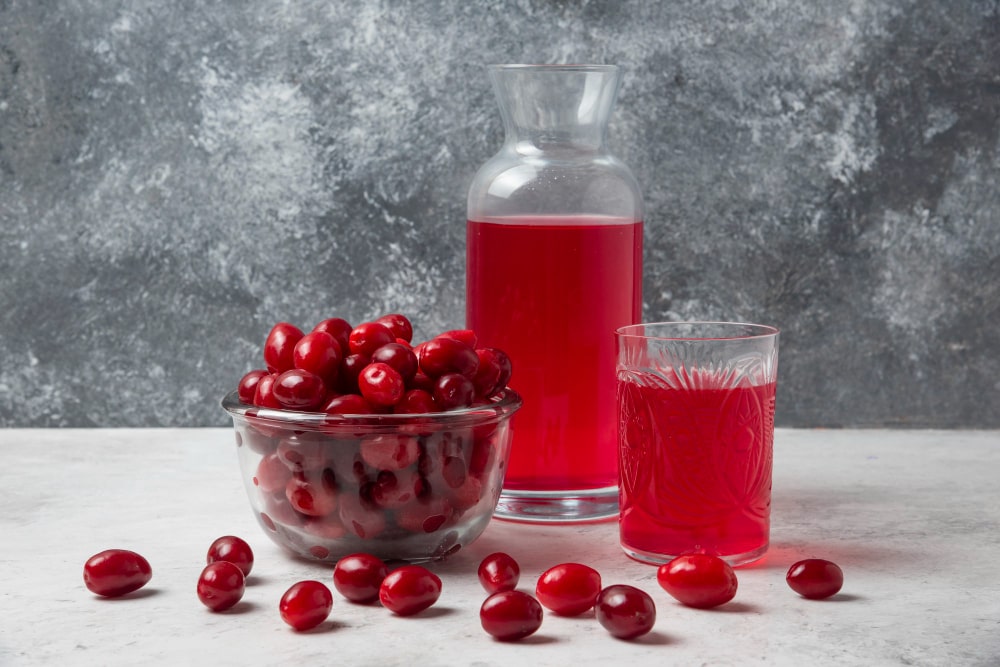Can cranberry juice help improve your kidneys health? It’s a good question to ask, as your kidneys are incredibly important organs that filter waste and other substances from the blood. Various factors can affect their function, from diet and lifestyle habits to genetic predisposition. Some believe that cranberry juice may offer some benefits for people with kidney disease, while others are more skeptical. In this article, we’ll explore cranberry juice potential benefits and side effects for kidneys health. We’ll also look at some other strategies to help ensure your kidneys stay healthy and function properly.
2) What Is Cranberry Juice Good For?
Cranberries are packed with vitamins and minerals, including vitamin C, manganese, copper, potassium, calcium, and magnesium. Drinking cranberry juice may offer certain health benefits due to its high concentration of antioxidants. Antioxidants are compounds that can help protect your cells from damage caused by oxidative stress.
3) Is Cranberry Juice Good for Kidneys?
Cranberry juice may be beneficial in supporting proper kidney function. This is because cranberries contain substances called proanthocyanidins, which may reduce the risk of urinary tract infections (UTIs). These UTIs can lead to issues with kidney function, so drinking cranberry juice is important. You may be helping to reduce the risk of these complications.
In addition, cranberry juice is high in antioxidants, which can help protect your kidneys from damage due to free radicals and oxidative stress. Drinking cranberry juice may also prevent the formation of kidney stones, as certain compounds found in cranberry juice can help prevent them.
Read More: Are Protein Bars Good for Weight Loss?
4) The Nutritional value of Cranberry Juice:
Cranberries are high in vitamins and minerals, including vitamin C, manganese, copper, potassium, calcium, and magnesium. In addition to these nutritional benefits, cranberry juice also contains proanthocyanidins and other antioxidants that may provide further health benefits.


5) Potential Benefits for Kidney Health:
Urinary Tract Infections (UTIs): Cranberry juice can help reduce the risk of developing urinary tract infections. It contains powerful antioxidants and compounds, which make it beneficial for maintaining bladder health. Research has shown that drinking cranberry juice helps keep bacteria from sticking to the urinary tract and bladder walls.
Kidney Stones: Drinking cranberry juice may also help prevent kidney stones from forming. A recent study showed that people who drank cranberry juice for six weeks had a lower risk of developing calcium oxalate crystals, which are a type of kidney stone.
Oxidative Stress and Inflammation: Research shows that compounds found in cranberry juice can help reduce oxidative stress and inflammation in the body, which can be beneficial for people with chronic kidney disease.
Blood Pressure Management: Cranberry juice is also rich in potassium, which can help regulate blood pressure. High blood pressure is a risk factor for kidney disease, so consuming cranberry juice may be beneficial for people with high blood pressure.
Read More: Best Allergy Medicine While Breastfeeding: Effective Solutions
Ingredient and Instruction:
Ingredients:
- 2 cups of cranberries
- 2 cups of water
- 1/4 cup of honey or sugar (optional)
Instructions:
1. Rinse the cranberries and place them in a medium saucepan with water. Bring to a rapid boil over high heat, then reduce the heat to low and let it simmer for 20 minutes.
2. Strain the liquid into a bowl using a cheesecloth or mesh strainer, discarding the solids. Allow mixture to cool before adding sweetener (if desired).
3. Pour the juice into an airtight container and store it in the refrigerator for up to one week. Enjoy!
Tips:
- Choose cranberry juice varieties that are low in sugar and caffeine-free.
- Opt for unsweetened or lightly sweetened versions.
- Look for cranberry juice concentrates to add to water or sparkling water.
- Talk to your doctor before making dietary changes, especially if you have health conditions or take medications.


Read More: White Sweet Potato Recipe : A Delicious and Nutritious Delight
6) Potential Side Effects and Precautions:
Diuretic Effects: Drinking cranberry juice can act as a diuretic, which means it increases the frequency of urination. This can be beneficial for people with kidney disease, but it may cause dehydration if too much is consumed.
Caffeine Content: Some types of cranberry juice contain caffeine, so it’s important to read labels and choose a caffeine-free variety. Caffeine can have adverse effects on blood pressure and other health conditions.
Unsweetened Cranberry Juice: Unsweetened cranberry juice has an intensely sour flavor due to its high acidity. It may not be enjoyable for some people to drink, so it’s important to find a variety that is sweetened or choose an alternative, such as cranberry juice concentrate.
Drug Interactions: Cranberry juice can interact with certain medications, such as blood thinners and antibiotics. It’s important to talk to your doctor if you are taking any medications before consuming cranberry juice.
7) Incorporating Cranberry Juice into Your Diet:
Cranberry juice can be a great addition to your diet. It’s important to choose varieties that are low in sugar and caffeine-free and opt for unsweetened or lightly sweetened versions if possible. You can also find cranberry juice concentrates that can be added to water or sparkling water for a refreshing drink.
It’s also important to remember that cranberry juice is not a substitute for medical treatment, so it should not be used as the sole source of treatment for any health condition. If you have any questions or concerns about incorporating cranberry juice into your diet, talk to your doctor or healthcare provider before making any dietary changes.
Read More: Self Tanner While Pregnant: What You Need to Know
Conclusion
In conclusion, cranberry juice can good for kidneys health. It may help reduce the risk of urinary tract infections (UTIs), as well as protect your kidneys from oxidative stress and inflammation. Additionally, it contains vitamins and minerals that can help regulate blood pressure and prevent the formation of kidney stones. As with any dietary change, it is important to talk to your doctor before adding cranberry juice, especially if you have any health conditions or take medications. With its potential benefits in mind, including cranberry juice in your diet could be a great way to support better kidneys health.
FAQs
A. It is best to follow the recommendations of your healthcare provider or dietitian regarding how much cranberry juice to drink for optimal kidneys health. Generally speaking, one glass a day would be enough to reap the benefits of this healthy beverage without overdoing it.
A. Cranberry juice is a rich source of antioxidants, which can help reduce inflammation in your body and support overall healthy kidneys. It also contains certain compounds called proanthocyanidins that may help prevent bacteria from sticking to kidney cells and developing into an infection.
A. While drinking some cranberry juice can good for your kidneys health, it’s important not to overdo it, as too much can cause stomach upset or other adverse effects. Some people may have an allergy or intolerance to this beverage, so if this is the case, they should avoid drinking it altogether or consult their healthcare provider before doing so.
A. No, these are not the same thing. Cranberry extract is a concentrated form of fruit usually found in capsule or tablet form and contains higher levels of antioxidants than regular cranberry juice. Cranberry extract is usually used to treat urinary tract infections, but it can also potentially benefit kidneys taken under the guidance of a medical professional.

